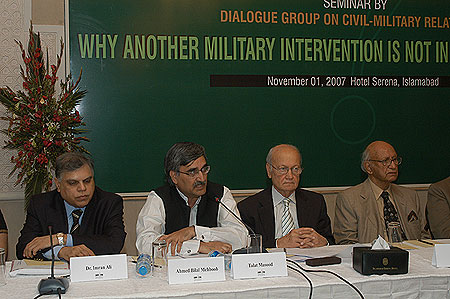|
|
| |
| EVENTS |
|
|
> Dialogue Group on Civil-Military Relations Warns against Martial Law, Emergency
|
| |
|
Seminar
November 02, 2007
Hotel Serena, Islamabad
|
|
| |
The Dialogue Group on Civil-Military Relations, facilitated by PILDAT has warned against the imposition of Martial Law or Emergency in the country saying that such steps would worsen the law and order situation and endanger the federation and unity of the country. The members of the Group were addressing a seminar on November 01, 2007 hosted by PILDAT on Why Another Military Intervention is NOT in Pakistan�s Interest. |
|
| |
The members of the Dialogue Group on Civil-Military Relations, including both eminent civilian minds and retired senior military officers, stressed that a free and fair election was the only way forward for the country at this time which could bring sustainable democracy to the country. �Concentration of power in one hand under a civilian set-up is bad, but it is worse as a military set-up because it weakens the federation,� they held.
|
|
| |
It is unfortunate that at a time when the government should be focussing its energies on ensuring a free and fair election, there are loud hints by key government officials about the possibility of Martial Law if the Supreme Court gives an unfavourable verdict to Gen. Pervez Musharraf in the case challenging the qualification of General Musharraf as a Presidential candidate. Such an attitude to browbeat the higher courts of the country is condemnable and Pakistan could ill-afford yet another military intervention, the members believed. If the military wants the country to be united, the unity can not be achieved without democracy. The military belief that political parties can not handle the country and its issues is unjustified. Let those who win, take care of the issues. No boy can or should predict the results of elections at this time. The future of the federation depends on respecting the will of the people and it is only the democratic process that can salvage the situation. |
|
| |
The government is likely to hide behind the worsening law and order scenario in the country to impose emergency or martial law. But the scenario will actually worsen as the suicide attacks and bomb blasts are really directed at the incumbents and the military for fighting a war on the behest of United States against its own people. Martial Law will only achieve short-term gains, if imposed as the country encounters newer realities through a changed and charged judiciary and a somewhat independent media and active civil-society. Moreover, the imposition of martial law will have a serious impact on the morale of Army as it has already been under extreme pressure, the members of the Dialogue Group on Civil-Military Relations believed. |
|
| |
The speakers believed that Pakistan today was flirting with the risk of becoming a failed state. It was unfortunate that Gen. Musharraf missed the excellent opportunity of strengthening the institutions and preferred to advance his own interests and that of his political structure. The US policy to support an individual in Pakistan had back-fired, they held and observed that the super power should have supported the process and the institutions instead. The speakers believed that the military today faced great challenge as it could not operate in vacuum without public support. They warned that politico-religious parties would start siding with militants if martial law was imposed and stressed that terrorists did not need sanctuaries and could operate even without safe havens. The US, the Dialogue Group believed, must realise that the stability of Pakistan and its tribal belt were inter-linked. |
|
| |
The Dialogue Group on Civil-Military Relations, which regularly meets since September 2004, is also known in the media as a Group of 18 that addressed a letter to the President of Pakistan back in July 2006 advising him against combining the office of the President of Pakistan with the Chief of Army Staff because it politicizes the Constitutional office of the Presidency and the institution of the Armed Forces. The members of the Group who spoke on the seminar included Lt. Gen. (Retd.) Abdul Qadir, Former Governor Balochistan; Lt. Gen. (Retd.) Abdul Qadir Baloch, Former Governor Balochistan/Corps Commander Quetta; Lt. General (Retd.) Asad Durrani, Former DG ISI; Dr. Imran Ali, Social Scientist; Lt. Gen. (Retd) Jamshed Gulzar, Former Chairman FPSC; Mrs. Mahtab Akbar Rashdi, Former Civil Servant; Makhdoom Shah Mehmood Qureshi, MNA; Lt. Gen. (Retd.) Moinuddin Haider, Former Governor Sindh; Mr. Rustam Shah Mohmand, Former Chief Secretary NWFP; Mr. Shafqat Mahmood, Former Senator & Minister; Mr. Shahid Hamid, Former Governor Punjab; Mr. Sartaj Aziz, Former Federal Minister; Brig (Retd.) Shaukat Qadir, Former Vice President IPRI; Senator S. M. Zafar; Mr. Ahmed Bilal Mehboob, Executive Director and Ms. Aasiya Riaz, Joint director PILDAT. |
|
| |
|
|
| |
|
|
| |
|
|
| |
|
|
| |

|
|
|
|
|
|
|
|
|